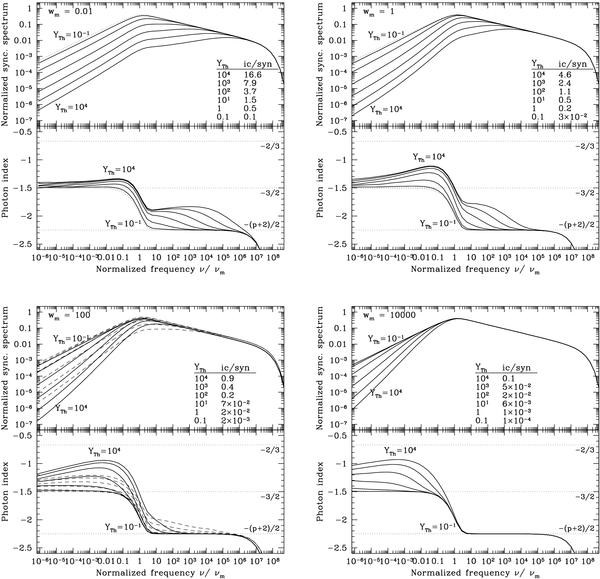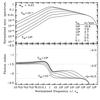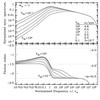Fig. 2

The effect of inverse Compton scatterings in Klein-Nishina regime on the fast cooling
synchrotron spectrum. The normalized synchrotron spectrum defined by
 is plotted as a
function of the normalized frequency
ν/νm, as well as the
corresponding photon index
dlnuν/dlnν − 1.
All spectra in thick solid line are computed numerically using a detailed radiative
code including synchrotron radiation and inverse Compton scatterings (see text).
Spectra in thin dotted line are computed with synchrotron radiation only. For clarity
purposes, all other processes (adiabatic cooling, synchrotron self-absorption,
γγ annihilation) are neglected. A ratio
Γc/Γm = 10-6 is assumed to
ensure that all electrons are in fast cooling regime. The maximum Lorentz factor of
electrons is fixed to Γmax = 104 Γmin so the high
energy cutoff in the synchrotron spectrum appears at the same frequency in all cases
plotted here. The four panels correspond to increasing values of the
wm parameter, wm = 0.01, 1,
100 and 104 from the top-left to the bottom-right panel, i.e. to a growing
importance of Klein-Nishina corrections for inverse Compton scatterings. In each
panel, the six curves in solid line correspond to increasing values of the
YTh parameter, YTh = 0.1, 1,
10, 102, 103 and 104, i.e. to a growing efficiency of
inverse Compton scatterings. The table inserted in each panel lists the values of the
ratio ℰic/ℰsyn of the inverse Compton
component (not plotted here) over the synchrotron component. In the bottom-left panel
(wm = 100), the synchrotron spectrum obtained assuming a
slow injection over tex (see text) is also plotted in
dashed line for comparison.
is plotted as a
function of the normalized frequency
ν/νm, as well as the
corresponding photon index
dlnuν/dlnν − 1.
All spectra in thick solid line are computed numerically using a detailed radiative
code including synchrotron radiation and inverse Compton scatterings (see text).
Spectra in thin dotted line are computed with synchrotron radiation only. For clarity
purposes, all other processes (adiabatic cooling, synchrotron self-absorption,
γγ annihilation) are neglected. A ratio
Γc/Γm = 10-6 is assumed to
ensure that all electrons are in fast cooling regime. The maximum Lorentz factor of
electrons is fixed to Γmax = 104 Γmin so the high
energy cutoff in the synchrotron spectrum appears at the same frequency in all cases
plotted here. The four panels correspond to increasing values of the
wm parameter, wm = 0.01, 1,
100 and 104 from the top-left to the bottom-right panel, i.e. to a growing
importance of Klein-Nishina corrections for inverse Compton scatterings. In each
panel, the six curves in solid line correspond to increasing values of the
YTh parameter, YTh = 0.1, 1,
10, 102, 103 and 104, i.e. to a growing efficiency of
inverse Compton scatterings. The table inserted in each panel lists the values of the
ratio ℰic/ℰsyn of the inverse Compton
component (not plotted here) over the synchrotron component. In the bottom-left panel
(wm = 100), the synchrotron spectrum obtained assuming a
slow injection over tex (see text) is also plotted in
dashed line for comparison.
Current usage metrics show cumulative count of Article Views (full-text article views including HTML views, PDF and ePub downloads, according to the available data) and Abstracts Views on Vision4Press platform.
Data correspond to usage on the plateform after 2015. The current usage metrics is available 48-96 hours after online publication and is updated daily on week days.
Initial download of the metrics may take a while.




